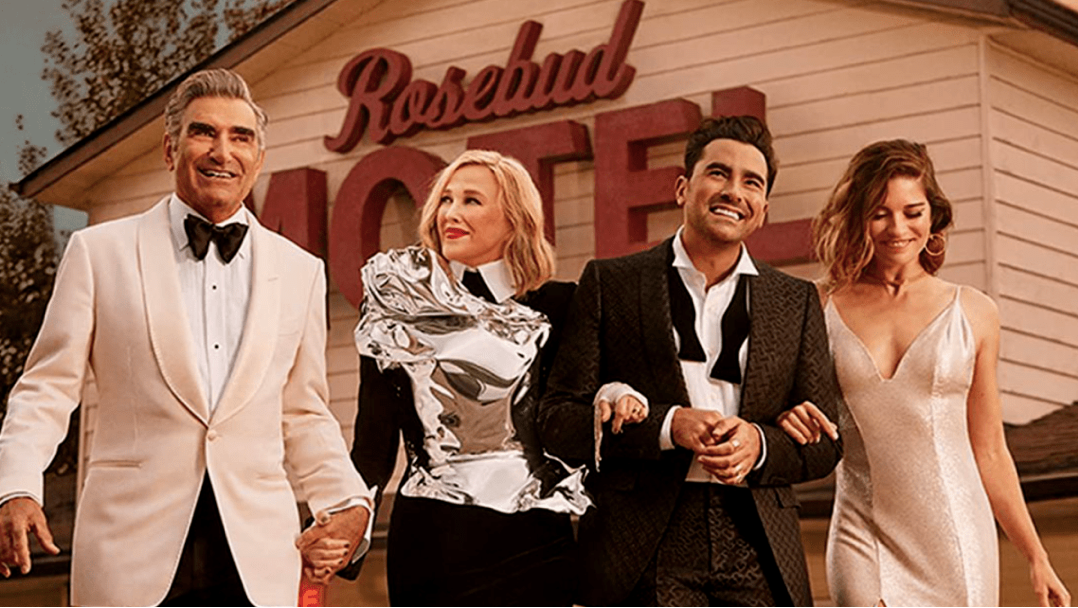The first thought that comes to my mind when I think of the Canadian television sitcom created by Daniel & Eugene Levy is warmth and genuinity. Schitt$ Creek is one of the many shows that represents many different feelings, emotions and ideologies (not to forget, communities) by actions, by what the show is in itself – not by explicitly talking about it. So many messages were passed onto the audience without even having dialogues about it – and that one quality stood out and rewarded the cast with 5 Emmys’ in 2020!
Without giving any spoilers, the show revolves around a filthy rich, classy, bougie, family that was thrown into the deep end (of bankruptcy) when their business manager commits fraud. They have nowhere else to go but to an empty, mundane motel in Schitt’s Creek, a tiny town bought as a joke by the rich father, Johnny Rose (yes, that rich!). The family has a sudden shift from very privileged to not privileged at all, from eating lavish meals to eating in one small cafe with an oversized menu, from buying clothes worth hundred of thousands of dollars to having to sell them for fifty dollars in thrift stores in order to earn some money.
Looking at Schitt$ Creek from the mental health perspective, dealing with that kind of low and sudden ripping away of privilege could have possibly led to trauma, anxiety and a lot of mental confusion – which was very well depicted in the first season. Denial, panic attacks, acceptance and absolute shock were some of the many ways the four family members dealt with the shift in privilege in Season 1. But after watching the whole show, the anxiety of the sudden change takes a backseat, and their resilience, strength, genuineness and its depiction really comes into the spotlight.
Here’s the amazing bit – even with all the character developments and changes, not once did the show shift its perspective to having motivating talks, or huge breakthroughs about dealing with anxiety, trauma or bankruptcy. It was always the constant working on their own understanding of the problem that led them there.
Each of them got their own space to grow into more mature, more agreeable people (even though they didn’t particularly have the physical space). Sure, they made mistakes, some pretty embarrassing ones too, but the genuineness remained – and so, they moved forward. At the end of it, it was not like they were completely healed or fine, they still wanted to wear their fancy clothes, wigs, and heels and demanded clean towels – and the emotional growth was still clear, but never outwardly spoken about.
What started off as a huge barrier in their ever flowing money – ended with all of them learning the hardships of having to work and earn it, to remake themselves, to finish their education, face embarrassing situations, to open up to various experiences, or challenges – and to continue to do so.
"I don't skate through life David, I walk through life...in really nice shoes."
Alexis Rose in Schitt’s Creek
In Schitt’s Creek, mental health is not explicitly talked about, but is handled delicately and with care on an everyday basis. Well, you might not even realise the characters are coping with mental health concerns the first time you watch the show (I don’t think they even address anxiety out loud)!
Coping with anxiety, unlike pop shows, is not about grand gestures, huge talks or episodes of darkness to light & recovery- it’s an ever changing (and notso linear) process. It’s about supporting the individual, giving them agency and acknowledgement to decide what they would want for themselves (which Stevie and Patrick excel at). If we dig a little deeper into the show, we see the characters supporting each other’s mental health, realistically – and how it should be. While I’m aware David and Alexis do exclaim that panic attacks are ‘made up by celebs’ – unknowingly, the Roses and the show still does a good job of riding together on the wavy road of mental health recovery. They deal with emotional outbursts, panic attacks, anxieties, episodes of being low (and high) – together & individually.
There is no ultimate good or bad in this show. There is no one individual more preferred that the other – they are all genuine, all yin and yang. No one character teaches the other to “do better”. They collectively – through experience – get better at handling their environment and the world. Each of them have their own personality traits (some are problematic, no doubt), but with genuinity and respect, they tackle these problems. They are allowed to make mistakes, to have emotional days, upheavals, highs and lows. They have their opinions, their own beliefs, and judgements and they grow with them. That’s the best part of this show. The Roses don’t go from being dysfunctional to being a loving, caring, typical family. They almost remain how they were, most of the growth however comes from their own sense of self. They looked at their strengths and really went along with it till they stood on their own feet, good at what they do, independently.
One of the best examples of emotional growth and support is the relationship between David and Alexis, who were portrayed as bougie, fancy and classy siblings in season 1 – and still remained that way in the last season – but had their relationship bloom over time. They went from spending no time together when they were rich, to spending most of their time together in a small motel. They opened up about how they have felt in the past, about their relationship, and they helped each to grow and gave each other (the sassiest of) advice in their hardest moments. And while they only grew to be more emotionally aware about themselves, which in turn allowed their relationship to grow sturdier.
If there is anything we need to take away from this show, it is resilience, the taking up of opportunities, patience, normalising mental health concerns, and normalising queer relationships. By the end of the show, you almost feel like you have known the characters for years! It feels like we have seen each character up close, to be irritated by their quirks and criticise them but also to understand them enough to care about them – almost like we are with our loved ones, right?
Especially in 2020, where all of us are also facing (our own kind of) struggles and experiences, it feels good to be a part of Roses’ inner circle, to see the Roses thrive, to see them take up opportunities to better themselves, to be genuine and headstrong about their goals – while also having emotional days of eating copious amounts of food, binge-watching shows and wallowing in their emotions. We saw them grow, be resilient, fight back and come forth in the strongest of ways.
It almost feels like a journey with them in 2020. And while we hope that we also reach that level of success and resilience someday, remember that we are already on that journey – of emotional growth, strength, openness, patience, genuineness and warmth. It may be with or without the kind of support they got, but if anything, it’s a start… and we love that journey for us!
Meet The Author


